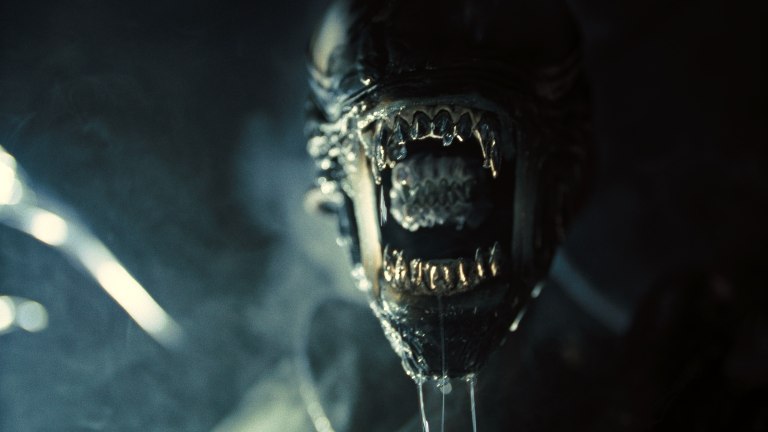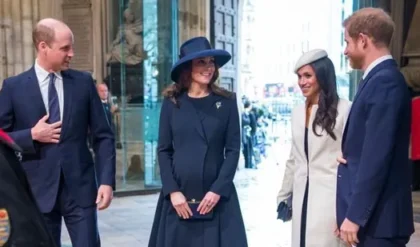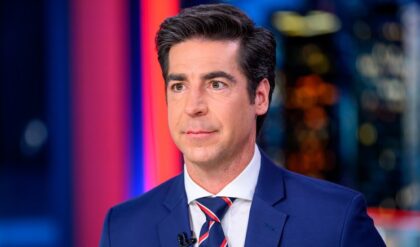The Xenomorph might be one of the best monsters in movie history but the real terror in Alien comes from the company Weyland-Yutani.

Photo: 20th Century Studios
Despite having lost three of her shipmates to an alien invader she doesn’t understand, despite learning that her shipmate and science officer Ash (Ian Holm) is an android, despite nearly getting killed when Ash tried to shove a porn mag down her throat, it’s something else that truly disturbs Ripley in Alien. It’s the two words she saw in a message from her employer: “crew expendable”
With those two words, Ripley (Sigourney Weaver) realizes that she’s at the bottom of a food chain, and not just because there’s a bloodthirsty Xenomorph on board. Never one to portray businesses or anyone with power in a favorable light, Alien director Ridley Scott took writers Dan O’Bannon and Ronald Shusett’s idea about a haunted house movie set in space and turned it into a screed against the ruling classes.
By focalizing the adventure through the perspective of working-class space truckers, Alien transcends its sci-fi horror trappings to become a statement on the predatory nature of modern capitalism. It’s commentary that not only remains relevant today but that makes Weyland-Yutani one of the most frightening corporations in all of sci-fi history.
The Company in Alien
They may have been woken up early from their cryosleep, but the crew of the mining vessel USCSS Nostromo don’t know that they’re about to become Xenomorph food at the start of Alien. Instead, they just think that they have been handed another task in their usual job.
“Before we dock, I think we oughta discuss the bonus situation,” declares Parker (Yaphet Kotto), who along with Brett (Harry Dean Stanton), represents the very bottom of the order on the ship. “You see, Mr. Parker and I feel that the bonus situation has never been on an equitable level,” Brett continues. When Captain Dallas (Tom Skerritt) points out that they’ve all signed a contract for their work and the company intends to honor it, Brett responds with the obvious: “Yes, but everybody else, uh, gets more than us.”
At first glance, this conversation seems like little more than world building. Scott takes his time introducing the audience to the characters, giving us an opportunity to care about them before the Xenomorph lets loose. But the structure of the conversation highlights the entire crew’s position in the galaxy. In the eyes of the Company, the crew matters only to the extent that they haul materials to which the Company can make a profit. If that cargo, as in the case of the Xenomorph, puts the crew at risk, then it’s a simple calculation.
The Company can operate in this way precisely for the same reason that Dallas can shut down the argument from Parker and Brett. They all operate according to contracts, a predetermined set of rules that determines their interactions with one another. From the bowels of the Nostromo to the top of the Company, people treat one another not as other humans but as signatories to a contract.
To be clear, that’s not entirely a bad thing. Had Dallas held to the letter of their contract, then he would have followed Ripley’s insistence that the infected Kane (John Hurt) not enter the ship. Ripley can hold her ground against Dallas’s human pleas for help precisely because of the protocols set in place by their employers and their contracts.
However, the resolution to that conflict illustrates the limits of the contractual approach. Ash seems to break the rules by letting Kane and Lambert (Veronica Cartwright) bring the infected Kane into the ship. But as Dallas makes clear later, Ash didn’t break the rules.
“How does that happen?” demands Ripley when she confronts Dallas. “Same way everything else happens,” he rejoins. “Orders from the Company.” The claustrophobic manner in which Scott shoots the tunnel in which they argue heightens their confinement. They’re both trapped within contracts they don’t understand from a company that doesn’t care about them.
“Standard procedure is do what they tell you,” Dallas says.
The Origin of Weyland-Yutani
The final shooting script for Alien only refers to the Nostromo’s employers as “the Company.” However, background props by production designer Ron Cobb do include logos for “Weylan-Yutani” (no, that’s not a typo).
“Weylan-Yutani for instance is almost a joke, but not quite,” Cobb said of the name for the “Authorized Portfolio of Crew Insignias” Alien collector’s kit. “I wanted to imply that poor old England is back on its feet and has united with the Japanese, who have taken over the building of spaceships the same way they have now with cars and supertankers. In coming up with a strange company name I thought of British Leyland and Toyota, but we couldn’t use “Leyland-Toyota” in the film. Changing one letter gave me “Weylan,” and “Yutani” was a Japanese neighbor of mine.”
While producing the 1986 sequel Aliens, writer and director James Cameron added a “d” to the end, christening the Company as “Weyland-Yutani,” which it has remained ever since.
While the name may have changed over the years, the nature of Weyland-Yutani has stayed the same, across numerous movies and several centuries. The most cartoony versions of the Company tend to be variations of Weyland-Yutani, such as Weyland Industries in Aliens vs. Predator or the military scientists in Alien: Resurrections. But Weyland-Yutani itself always covers its cold profit calculations behind a human face.
In Alien, that approach takes the form of Ash, an android operative for the Company who looks like a human being. But the most chilling version appears in Aliens, in the form of Carter Burke (Paul Reiser). For the first third of Aliens, Burke plays like Ripley’s only friend, a friendly face willing to listen to her in an unfamiliar future. Reiser never shows his hand as a performer, and instead puts all of his natural charisma into making Burke a guy we trust.
To the credit of both Reiser and Cameron, Burke maintains that approach throughout the movie. Even after Ripley discovers his plan to infect both her and Newt (Carrie Henn) and kill the Marines to sneak the Xenomorph embryo back to Weyland-Yutani, he’s convinced he’s doing the right thing.
As viewers, we’re tempted to read his excuses as lies. When he insists that Ripley and the marines are “delusional,” he might be grasping at anything to save his own hide. Or he might be in fact be the most realistic person in the room. After all, as Dallas told Ripley decades earlier, standard procedure comes from the Company. And if Weyland-Yutani told Burke to kill everyone and bring home the embryos, then he’s living in the reality as it exists for all of them. Anyone who thinks that the Company cares about them as people, they’re the ones who are delusional.
Either way, the sequel reveal once again the horrors of the Company, and in juxtaposition with the Xenomorph hive who work together to protect their queen and her nest. Ripley sums it up best in one of the franchise’s most iconic lines: “You know, Burke, I don’t know which species is worse. You don’t see them fucking each other over for a goddamn percentage.”
Even by the time of Alien‘s release 45 years ago, horror stories in which “man is the real monster” had become cliche. After all, it’s Carl Denham’s (Robert Armstrong) thirst for glory that sends the Eighth Wonder of the World on a rampage in 1933’s King Kong. Even with Halloween just a year earlier, the most chilling sequence involves less an attack by the inhuman Michael Meyers and more from the nonchalance with which Laurie Strode’s neighbors ignore her pleas and turn off their lights.
But Alien puts a new spin on the idea by emphasizing class and capital. Man may be a monster in any case, but it’s the system of capital that unleashes his full power. It allows humans to turn themselves into predators much scarier than the Xenomorph. While Ash admires the “purity” of the Xenomorph, seeing it as a “survivor, unclouded by conscience, remorse, or delusions of morality,” the Company run by humans is something even worse as it sends out the message: “crew expendable.”


